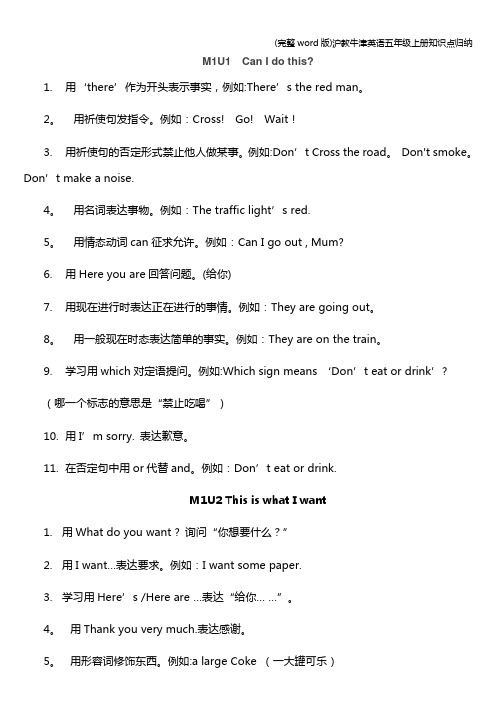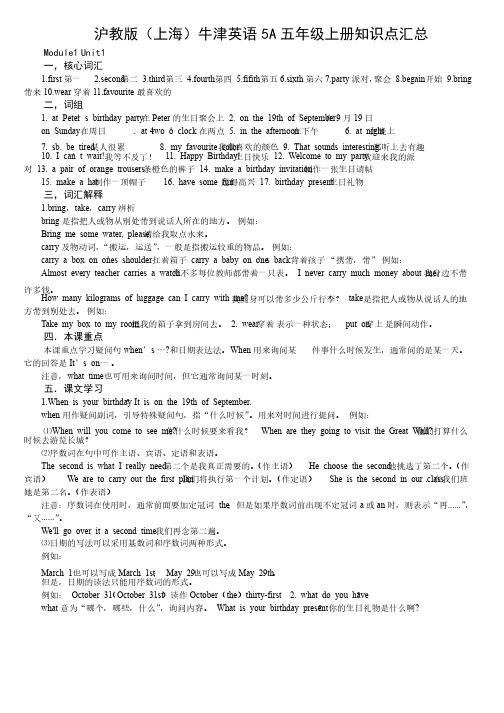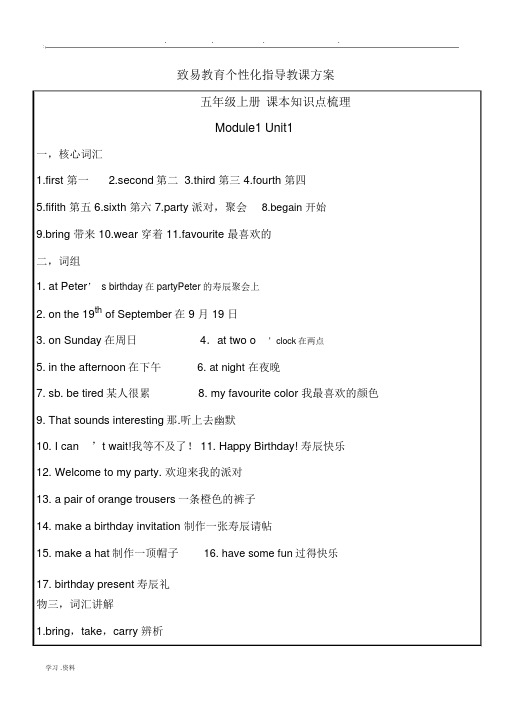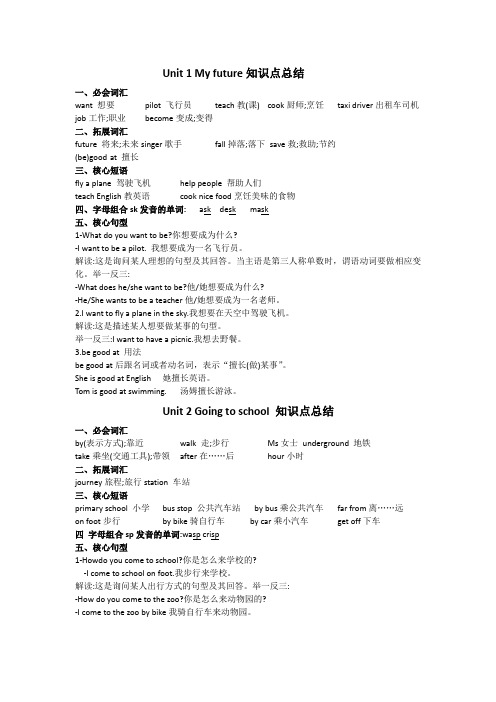沪教牛津版五年级英语上册全册知识点汇总
(完整word版)沪教牛津英语五年级上册知识点归纳

M1U1 Can I do this?1. 用‘there’作为开头表示事实,例如:There’s the red man。
2。
用祈使句发指令。
例如:Cross! Go! Wait!3. 用祈使句的否定形式禁止他人做某事。
例如:Don’t Cross the road。
Don't smoke。
Don’t make a noise.4。
用名词表达事物。
例如:The traffic light’s red.5。
用情态动词can征求允许。
例如:Can I go out , Mum?6. 用Here you are回答问题。
(给你)7. 用现在进行时表达正在进行的事情。
例如:They are going out。
8。
用一般现在时态表达简单的事实。
例如:They are on the train。
9. 学习用which对定语提问。
例如:Which sign means ‘Don’t eat or drink’?(哪一个标志的意思是“禁止吃喝”)10. 用I’m sorry. 表达歉意。
11. 在否定句中用or代替and。
例如:Don’t eat or drink.M1U2 This is what I want1. 用What do you want ? 询问“你想要什么?”2. 用I want…表达要求。
例如:I want some paper.3. 学习用Here’s /Here are …表达“给你… …”。
4。
用Thank you very much.表达感谢。
5。
用形容词修饰东西。
例如:a large Coke (一大罐可乐)6。
用情态动词can征求许可。
例如:Can I have some fish,please?7。
学习关于菜的名称。
例如:noodles、vegetablesM1U3 This is what I need1。
关于学习用品的单词。
例如:books.2。
用’What do you need for school ?' 询问“你上学需要什么?"3。
完整沪教牛津英语五年级上册知识点归纳

M1U1 Can I do this?1. 用‘there'作为开头表示事实,例如:There's the red man。
2. 用祈使句发指令。
例如:Cross! Go! Wait!3. 用祈使句的否定形式禁止他人做某事。
例如:Don't Cross the road. Don't smoke. Don'tmake a noise.4. 用名词表达事物。
例如:The traffic light's red.5. 用情态动词can征求允许。
例如:Can I go out , Mum?6. 用Here you are回答问题。
(给你)7. 用现在进行时表达正在进行的事情。
例如:They are going out。
8. 用一般现在时态表达简单的事实。
例如:They are on the train.9. 学习用which对定语提问。
例如:Which sign means ‘Don't eat or drink'? (哪一个标志的意思是“禁止吃喝”)10. 用I'm sorry. 表达歉意。
11. 在否定句中用or代替and。
例如:Don't eat or drink.M1U2 This is what I want1. 用What do you want ? 询问“你想要什么?”2. 用I want…表达要求。
例如:I want some paper.3. 学习用Here's /Here are …表达“给你……”。
4. 用Thank you very much.表达感谢。
5. 用形容词修饰东西。
例如:a large Coke (一大罐可乐)6. 用情态动词can征求许可。
例如:Can I have some fish, please?7. 学习关于菜的名称。
例如:noodles、vegetablesM1U3 This is what I need1. 关于学习用品的单词。
沪教版(上海)牛津英语5A五年级上册知识点汇总

沪教版(上海)牛津英语5A五年级上册知识点汇总Module1Unit1一,核心词汇1.first第一 2.second第二第二 3.third第三 4.fourth 第四第四 5.fifith第五6.sixth第六7.party派对,聚会 8.begain开始 9.bring 带来10.wear穿着11.favourite最喜欢的二,词组1. at Peter’s birthday party在Peter的生日聚会上 2. on the 19th of September在9月19日on Sunday在周日 4在晚上.at two o’clock在两点 5. in the afternoon在下午 6. at night7. sb. be tired某人很累某人很累 8. my favourite color我最喜欢的颜色 9. That sounds interesting.那听上去有趣10. I can’t wait! 我等不及了!欢迎来我的派我等不及了! 11. Happy Birthday! 生日快乐 12. Welcome to my party. 一条橙色的裤子 14. make a birthday invitation制作一张生日请帖对 13. a pair of orange trousers15. make a hat制作一顶帽子 16. have some fun过得高兴 17. birthday present生日礼物三,词汇解释1.bring,take,carry辨析bring是指把人或物从别处带到说话人所在的地方。
例如:Bring me some water, please.请给我取点水来。
carry及物动词,“搬运,运送”,一般是指搬运较重的物品。
例如:carry a box on one’s shoulder扛着箱子 carry a baby on one’s back背着孩子“携带,带”例如:Almost every teacher carries a watch.我身边不带差不多每位教师都带着一只表。
沪教牛津五年级英语上册牛津英语五年级上册知识点整理

沪教牛津五年级英语上册复习内容模块纵览Module1 Getting to know each other本模块是关于认识自己及了解他人。
Unit1 My future介绍了各种职业,探讨未来想从事的职业。
Unit2 Going to school介绍了上学或上班的出行方式。
Unit3 My birthday介绍了有关生日的庆祝活动。
Module 2 Relationships本模块是关于自己与家长及朋友的关系。
Unit4 Grandparents介绍了和祖父母一起进行的活动。
Unit 5 Friends介绍了自己和好朋友之间的相同和不同之处。
Unit 6 Family life介绍了不同的房间及家庭生活。
Module 3 Out and about本模块是关于丰富多彩的户外生活。
Unit 7 At the beach介绍了海边休闲度假时所做的一些事情。
Unit 8 An outing描述了一次“寻宝”活动。
Unit 9 Around the city是关于问路及指路。
Module 4 The natural world本模块是关于大自然和人们日常生活之间的关系。
Unit 10 Wind认识风的各种状态。
Unit 11 Water介绍了水的各种用途。
Unit 12 Fire介绍了一些基本的防火知识。
第一单元复习1.词组Jump into the lakefly a planecook nice food(be) afraid of flyinghelp peopledrive a taxi(be)good at...2.句型用What do you want to be ?询问对方将来想从事的职业。
用I want to be ...及I want to(do)...介绍自己未来想从事的职业及理由。
3.难点1)当句子主语为第三人称单数时,动词要做适当的变化。
2)want to do与want to be的正确用法。
上海牛津英语5年级上册知识点梳理超全5AM1M4

致易教育个性化指导教课方案五年级上册课本知识点梳理Module1 Unit1一,核心词汇1.first 第一2.second第二3.third 第三4.fourth 第四5.fifith 第五6.sixth 第六7.party 派对,聚会8.begain 开始9.bring 带来 10.wear 穿着 11.favourite 最喜欢的二,词组1.at Peter’ s birthday在partyPeter的寿辰聚会上2.on the 19th of September在 9 月 19 日3. on Sunday在周日4.at two o’clock在两点5. in the afternoon在下午6. at night 在夜晚7. sb. be tired某人很累8. my favourite color 我最喜欢的颜色9. That sounds interesting那.听上去幽默10. I can’t wait!我等不及了!11. Happy Birthday! 寿辰快乐12.Welcome to my party. 欢迎来我的派对13.a pair of orange trousers一条橙色的裤子14.make a birthday invitation 制作一张寿辰请帖15. make a hat制作一顶帽子16. have some fun过得快乐17.birthday present寿辰礼物三,词汇讲解1.bring,take,carry 辨析bring 是指把人或物从别处带到说话人所在的地方。
比方:Bring me some water, please请.给我取点水来。
carry 及物动词,“搬运,运送”,一般是指搬运较重的物品。
比方:carry a box on one’ s shoulder扛着箱子carry a baby on one’背s着back孩子“携带,带”比方:Almost every teacher carries a watch差.不多每位教师都带着一只表。
牛津上海版(三起)英语五年级上册《Unit1-6单元知识点总结》素材

Unit 1 My future知识点总结一、必会词汇want 想要pilot 飞行员teach教(课)cook厨师;烹饪taxi driver出租车司机job工作;职业become变成;变得二、拓展词汇future 将来;未来singer歌手fall掉落;落下save救;救助;节约(be)good at 擅长三、核心短语fly a plane 驾驶飞机help people 帮助人们teach English教英语cook nice food烹饪美味的食物四、字母组合sk发音的单词: ask desk mask五、核心句型1-What do you want to be?你想要成为什么?-I want to be a pilot. 我想要成为一名飞行员。
解读:这是询问某人理想的句型及其回答。
当主语是第三人称单数时,谓语动词要做相应变化。
举一反三:-What does he/she want to be?他/她想要成为什么?-He/She wants to be a teacher他/她想要成为一名老师。
2.I want to fly a plane in the sky.我想要在天空中驾驶飞机。
解读:这是描述某人想要做某事的句型。
举一反三:I want to have a picnic.我想去野餐。
3.be good at 用法be good at后跟名词或者动名词,表示“擅长(做)某事”。
She is good at English她擅长英语。
Tom is good at swimming.汤姆擅长游泳。
Unit 2 Going to school 知识点总结一、必会词汇by(表示方式);靠近walk 走;步行Ms女士underground 地铁take乘坐(交通工具);带领after在……后hour小时二、拓展词汇journey旅程;旅行station 车站三、核心短语primary school 小学bus stop 公共汽车站by bus乘公共汽车far from离……远on foot步行by bike骑自行车by car乘小汽车get off下车四字母组合sp发音的单词:wasp crisp五、核心句型1-Howdo you come to school?你是怎么来学校的?-I come to school on foot.我步行来学校。
【最新】沪教牛津英语五年级上册知识点归纳
沪教牛津英语五年级上册知识点归纳作为开头表示事实;例如:There’s the red man。
1. 用‘there’2. 用祈使句发指令。
例如:Cross! Go! Wait!3. 用祈使句的否定形式禁止他人做某事。
例如:Don’t Cross the road. Don’t smoke. Don’make a noise.4. 用名词表达事物。
例如:The traffic light’s red.5. 用情态动词can征求允许。
例如:Can I go out , Mum?6. 用Here you are回答问题。
(给你)7. 用现在进行时表达正在进行的事情。
例如:They are going out。
8. 用一般现在时态表达简单的事实。
例如:They are on the train.9. 学习用which对定语提问。
例如:Which sign means ‘Don’t eat or drink’?(哪一个标志的意思是“禁止吃喝”)10. 用I’m sorry. 表达歉意。
11. 在否定句中用or代替and。
例如:Don’t eat or drink.M1U2 This is what I want1. 用What do you want ? 询问“你想要什么?”2. 用I want…表达要求。
例如:I want some paper.表达“给你……”。
3. 学习用Here’s /Here are …4. 用Thank you very much.表达感谢。
5. 用形容词修饰东西。
例如: a large Coke (一大罐可乐)6. 用情态动词can征求许可。
例如:Can I have some fish, please?7. 学习关于菜的名称。
例如:noodles、vegetablesM1U3 This is what I need1. 关于学习用品的单词。
例如:books。
询问“你上学需要什么?”2. 用’What do you need for school ?’ 3. 用We need … 表达“我们需要……”。
沪教牛津版五年级英语上册全册知识点汇总
沪教牛津版五年级英语上册全册知识点汇总Module 1: Getting to Know Each OtherIn this module。
we will learn some core vocabulary words。
expand our vocabulary。
and practice using some basic XXX.Core Vocabulary:1.Nouns: future。
pilot。
job。
singer。
lifeguard。
Ms。
journey。
underground。
n。
hour。
party。
thing。
hat.2.XXX: want。
teach。
fall。
save。
e。
walk。
take。
begin。
bring.3.Adjectives: favorite。
interesting.4.ns: by。
after.5.Adverbs: when.6.Dual-class words: cook.7.Phrases: taxi driver。
be good at。
primary school。
bus。
by bus。
far from。
by bike。
by car。
get off。
have fun.XXX Vocabulary:1.Nouns: doctor。
XXX。
sky。
subject.2.Months: January。
February。
March。
April。
May。
June。
July。
August。
September。
October。
XXX。
XXX.3.XXX: help.4.Phrases: fly a plane。
be afraid of.XXX Structures:1."What do you want to be?" - "I want to be a pilot." (Asking XXX.)2."What do you want to be?" - "I want to be a XXX." (Asking XXX.)In this module。
“牛津上海版”小学英语五年级(上)知识点大全
语法
1. 特 殊 疑 问 句 What do you want to be? 2.动词 want want to be sb. I want to be a pilot. want sth. I want a hamburger. want to do sth. I want to fly. 3. 一 般 现 在 时 例 Peter wants to be a pilot.
核心词汇
1.taxi 出租车 2.underground 地铁 3.zebra crossing 斑马线 4.traffic lights 红绿灯 5.pavement 人行道 6.live 住 7.leave 离开 8.on foot 步行 9.arrive 到达
10.cross 横过
词组
词汇辨析 句子
1.at Peter’s birthday party 在 Peter 的生日聚会上 2.on the 19th of September 在 9 月 19 日 3.on Sunday 在周日 4.at two o’clock 在两点 5.in the afternoon 在下午 6.at night 在晚上 7.sb.be tired 某人很累 8.my favourite color 我最喜欢的颜色 9.That sounds interesting.那听上去有趣。 10.I can’t wait!我等不及了! 11.Happy Birthday!生日快乐! 12.Welcome to my party.欢迎来我的派对。 13.a pair of orange trousers 一条橙色的裤子 14.make a birthday invitation 制作一张生日请帖 15.make a hat 制作一顶帽子 16.have some fun 过得高兴 17.birthday present 生日礼物
牛津沪教 五上知识点
五上知识点1 My futureKey patterns特殊疑问句:What do you want to be? I want to be a pilot. I want to fly a plane in the sky. What does Kitty want to be? He wants to be a doctor. He wants to help people. .....一般疑问句:Do you want to be... ?Yes,I do.I want to be ../ No,I don’t .I want to be ..I want to.. Does she want to be...?Yes,she does.She wants to be ../No,she doesn’t .She wants to be ..She wants to...Key wordsV .want, teach, become ,save, fallJobs: cook, taxi driver, pilot,lifeguard singer (复习之前四上所学职业teacher doctor fireman nurse bus driver..)词组:be good at语法重点:一般现在时do /does的用法。
I/He wants to do 某事.2.Going to schoolKey patterns特殊疑问句:How do you come to school?I come to school on foot/by bus.Key wordsby, take ,walk, Ms, after ,hour, journey ,station,underground(复习三下其他交通工具bus car....)词组:primary school far from, bus stop, get off.语法重点:表示乘坐交通工具学会使用介词by / 学会使用动词take/on foot3.My birthdayKey patterns特殊疑问句:When's your birthday? It's on 26th September.Key wordsparty, when, begin, bring,thing, favourite,interesting, hat,(月份和基数词的复习)词组:have fun语法重点:When 的用法具体日子以及介词on 的用法序数词的变化规律4.GrandparentsKey patterns特殊疑问句:What do you usually with your grandparents?--- I usually play chess with my grandpa.(always/often/sometimes...)一般疑问句:Do you play sport with.your grandparents?Yes,I do.No,I don’t./ No, I never...with...Key wordsAlways, usually , often sometimes, never, visit,词组:play sport,go shopping语法重点:频率副词与一般现在时结合的使用5.FriendsKey patterns1.We both like sport.Kity likes...Alice likes... They both like...We all like helping people2.Who’s your good friend? ....is my good friend....are my good friends.3.Are you in the same class?---Yes, We’re both/ all in Class...---No. We’re in different classes.4.Do you like the same sport?---Yes. We both/all like...---No. I like...and...likes....Key wordsclever, same,class, both, heavy different, word easy, say, ask,answer,cross,carry, Bored,then,soon词组;make a phone call, each other语法重点:一般现在时单三的用法Both 的用法6.Family lifeKey patterns1.I'm doing my homework. He’s cooking dinner.2.Where are you? ----I’m in the living room/ bedroom/bathroom/kitchen.3.I usually watch TV with my parents in the evening,but now we’re looking at the stars.Key words房间名称:living room bedroom, kitchen bathroom.(结合2A my left shoe), Life,their,light,watch,TV,before,bedtime关键词组:play word games, watch TV,cook dinner,wash hands ,do homework,turn off,tell a story,model plane语法重点:现在进行时的用法Sb+be+doing sth一般现在时和现在进行时的对比找提示词7.At the beachKey patternsIs Paul collecting shells?Yes,he isKey wordsbeach, enjoy, collect, sea, letter, put know, year,sunshine,shell,词组on holiday ,have a good time语法重点:现在进行时的一般疑问句的用法Be+Sb+doing sth?Yes+人称代词+be.No+人称代词+ben’t.8.An outingKey patternsWhat are you doing?I'm reading the map.Key wordsMap hill, find another, lake, key,think,outing,diamond,funny,hole,词组:at the top of ,get through语法重点:现在进行时的特殊疑问句的用法What be sb doing sth?9.Around the cityKey patternsWalk along Winter Street .Turn left at Spring StreetKey wordspost office, quite along, turn, left, right, between flower shop hospital, toy shop,straight,road词组:get to语法重点:How引导的特殊疑问句以及指令性语言turn left...10.WindKey patternsThe children are flying their kites happily.Key wordsblow, gently, softly,strongly, happily move, slowly, quickly, sound, paper, quiet,windmill,wind-bell,cut语法重点:副词的用法,副词的变化规律11.WaterKey patternsWe use water to wash our hands.Key wordsuse, clothes, farmer useful, up, shine, over tree, ground,tap,vegetable,drop,mountain, inside词组:grow crops, put out fires语法重点:How引导的特殊疑问句12 FireKey patternsWe must be careful with fire. We mustn't play with matchesKey wordsFire hurt. must careful. smoke. Hate,burn,safety,match,heat词组:be careful with, not at all,burn down语法重点:情态动词must和mustn’t的用法。
- 1、下载文档前请自行甄别文档内容的完整性,平台不提供额外的编辑、内容补充、找答案等附加服务。
- 2、"仅部分预览"的文档,不可在线预览部分如存在完整性等问题,可反馈申请退款(可完整预览的文档不适用该条件!)。
- 3、如文档侵犯您的权益,请联系客服反馈,我们会尽快为您处理(人工客服工作时间:9:00-18:30)。
沪教牛津版五年级英语上册全册知识点汇总Module 1 Getting to know each other一、核心词汇1.名词:future 将来;未来pilot 飞行员job 工作;职业singer 歌手lifeguard 救生员Ms 女士journey 旅程;旅行underground 地铁station 车站hour 小时party 聚会thing 东西;事物hat 帽子2.动词:want 想要teach 教(课) fall 掉落;落下save 救;救助;节约become 变成;变得walk 走;步行take 乘坐(交通工具);带领begin 开始bring 带来3.形容词:favorite 最喜欢的interesting 有趣的4.介词:by(表示方式);靠近after 在……后5.副词:when 什么时候6.兼类词:cook 厨师;烹饪7.短语:taxi driver 出租车司机(be) good at 擅长primary school 小学bus stop 公共汽车站by bus 乘公共汽车far from 离……远on foot 步行by bike 骑自行车by car 乘小汽车get off 下车have fun 尽情玩二、拓展词汇1.名词:doctor 医生teacher 老师sky 天空subject 科目2.月份名词:January (Jan.) 一月February(Feb.) 二月March(Mar.) 三月April(Apr.) 四月May 五月June(Jun.) 六月July(Jul.) 七月August(Aug.) 八月September(Sept.) 九月October(Oct.) 十月November(Nov.) 十一月December(Dec.) 十二月3.动词:help 帮助4.短语:fly a plane 驾驶飞机be afraid of 害怕三、核心句型1.—What do you want to be? 你想要成为什么?—I want to be a pilot. 我想要成为一名飞行员。
解读: 这是询问某人理想的句型及其回答。
举一反三: —What do you want to be?你想要成为什么?—I want to be a teacher. 我想要成为一名老师。
2.I want to fly a plane in the sky. 我想要在天空中驾驶飞机。
解读: 这是描述某人想要做某事的句型。
举一反三: I want to have a picnic. 我想去野餐。
3.—How do you come to school?你是怎么来学校的?—I come to school on foot. 我步行来学校。
解读: 这是询问某人出行方式的句型及其回答。
举一反三: —How do you come to the zoo? 你是怎么来动物园的?—I come to the zoo by bike. 我骑自行车来动物园。
4.—When’s your birthday? 你的生日是什么时候?—It’s on 26th September. 在九月二十六号。
解读: 这是询问某人生日是什么时候的句型及其回答。
举一反三: —When is Joe’s birthday? 乔的生日是什么时候?—It’s on 2nd March. 在三月二号。
5.—Can you come to my birthday party, Joe? 你能来参加我的生日聚会吗,乔?—Sure. 当然。
解读: 这是询问对方能否做某事的句型及其回答。
举一反三:—Can you come to my school?你能来我们学校吗?—Sure. 当然。
6.—What time does the party begin? 聚会什么时候开始?—It begins at two o’clock in the afternoon. 下午两点开始。
解读: 这是询问某活动开始时间的句型及其回答。
举一反三: —What time does the next class begin? 下一节课什么时候开始?—It begins at 9:00 a.m. 上午九点开始。
7.Let’s have some fun! 让我们尽情地玩吧!解读: 这是以let开头的祈使句。
举一反三: Let’s go shopping together! 让我们一起去购物吧!四、了解句型1.I want to help people. 我想要帮助人们。
解读: help 表示“帮助”,其后可跟名词、代词或动词不定式。
举一反三: She helps me to do the housework. 她帮助我做家务。
2.Who wants to fly a plane in the sky? 谁想要在天空中驾驶飞机?解读: 这是询问谁想要做某事的句型。
举一反三: —Who wants to buy the book? 谁想要买这本书?—Lily. 莉莉。
3.What subject does Alice want to teach? 爱丽丝想要教什么科目?解读: 这是询问某人想要教什么科目的句型。
举一反三: —What subject does Lucy want to teach? 露西想要教什么科目?—Maths.数学。
4. …, but he is afraid of flying. ……,但是他害怕飞行。
解读: 这是描述某人害怕做某事的句型。
举一反三:I’m afraid of walking in the dark. 我害怕走夜路。
5.Alice and I walk to school together. 爱丽丝与我一起步行来学校。
解读: 因为此句的主语是Alice and I,所以谓语动词用want。
当第一人称与第三人称并列时,第三人称放在前面,第一人称放在后面,中间加and。
举一反三: Lucy and I want to go home. 露西与我想要回家。
6.What about you, Peter? 你呢,彼得?解读: 这是征求某人意见的句型。
举一反三: I like apples. What about you? 我喜欢苹果。
你呢?7.There is an underground station near Ms Guo’s home. 在郭女士家附近有一个地铁站。
解读: 这是描述某地有某物的there be句型。
举一反三: There is a school near here. 这附近有所学校。
8.Welcome to my “orange party”. 欢迎来到我的“橘色聚会”。
解读: 这是表达欢迎某人来某地的句型。
举一反三: Welcome to our shop. 欢迎来到我们商店。
9.—What orange things do you have? 你们有什么橘色的东西吗?—I have an orange hat.我有一顶橘色的帽子。
解读: 这是询问某人是否有某物的句型及其回答。
举一反三: —What book does he have? 他有什么书?—He has a maths book.他有一本数学书。
10.Here are some orange things for you. 这些橘色的东西是给你们的。
解读: 这是由here引导的倒装句。
举一反三: Here is a book for you. 这本书是给你的。
Module 2 Relationships一、核心词汇1.名词:class 班;班级word 单词life 生活bedroom 卧室kitchen 厨房bathroom 浴室;卫生间light 灯;光TV 电视;电视机bedtime 就寝时间2.动词:visit 看望;拜访;参观cross 穿越;越过carry 背;提;拿say说ask 问answer 回答watch 观看;观察3.形容词:clever 聪明的same 相同的heavy 重的;沉的different 不同的bored 无聊的easy 容易的their他们的;她们的;它们的4.副词:then 然后;那么soon 很快;不久5.频率副词:usually 通常often 经常sometimes 有时always 总是;一直never 从不6.代词:both (两个)都7.介词:before 在……以前8.短语:play sport 做运动go shopping 去购物each other 互相make phone calls 打电话living room 客厅model plane 飞机模型do … homework 做家庭作业turn off 关掉watch TV 看电视tell a story 讲故事二、拓展词汇1.介词:with 与……2.短语:live in 居住play table tennis 打乒乓球三、核心句型1.—What do you usually do with your grandparents? 你通常和你的祖父母做什么?—I usually play chess with my grandpa. 我通常和我的祖父下棋。
解读: 这是询问对方通常和某人做什么的句型及其回答。
举一反三: —What do you usually do with your mother? 你经常和你的妈妈做什么?—We usually cool meals for my family. 我们经常为家人做饭。
2.We both like sport. 我们都喜欢运动。
解读: 这是描述两人都喜欢做某事的句型。
举一反三: We both go to school on foot. 我们都步行去上学。
3.I’m doing my homework. 我正在做家庭作业。
解读: 这是描述某人正在做某事的句型。
举一反三: He is swimming in the river. 他正在河里游泳。
四、了解句型1.I often write emails to them. 我经常给他们写电子邮件。
解读: 这是描述某人写电子邮件的频率的句型。
举一反三: I often write emails to Lily at weekends. 我经常周末给莉莉写电子邮件。
2.My grandparents live far from my home. 我的祖父母住得离我家很远。
解读: 这是描述某人的居住地离某地远的句型。
举一反三: My grandmother lives not far from my home. 我奶奶住得离我家不远。
